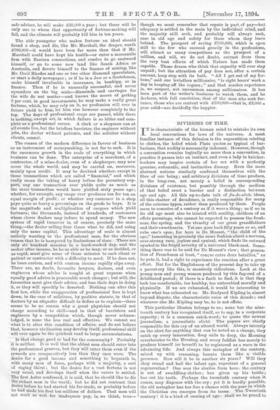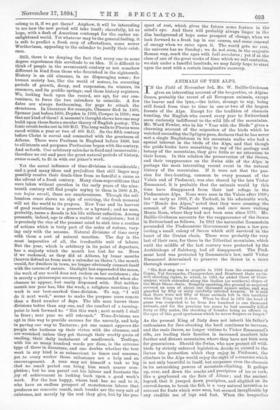DIVISIONS OF TIME.
IT is characteristic of the human mind to mistake its own local conventions for laws of the universe. A most familiar instance of this delusion is the superstition relating to clothes, the belief which Plato quotes as typical of bar- barians, that nudity is necessarily indecent. However, though a convention remains logically no more than a convention, in practice it passes into an instinct, and even a lady in knicker- bockers may inspire certain of her sex with a perfectly genuine, automatic, and instinctive dismay. Even the more abstract notions similarly confound themselves with the fibre of our being ; and arbitrary divisions of time produce, in the long-run, not merely a belief in corresponding divisions of existence, but possibly through the medium of that belief erect a barrier and a distinction between age and age. All this up-to-date talk of fin-de-siecle ideas, all this chatter of decadence, is really responsible for many of the extreme types, rather than produced by them. People seem to conceive of a century as if it were a thing; as if we in its old age must also be tainted with senility, children of an effete parentage, who cannot be expected to possess the fresh- ness, the spring, and the vivacity of our great grandfathers and their sweethearts. Yet one goes back fifty years or so, and rubs one's eyes; for here is De Musset, "the child of the age," lamenting in precisely the same fashion about a nervous, over-strung race, joyless and cynical, which finds its outward symbol in the frigid severity of a universal black-coat. Some- thing there was to be said for De Musset's view ; that genera- tion of Frenchmen at least, " (=cue entre deux batailles," as he puts it, had a right to experience the reaction after a great effort. But for the Englishmen of the present day to take up a parrot-cry like this, is massively ridiculous. Look at the young men and young women produced by this fag-end of a debilitated period; if there is a fault to find, it is that they look too comfortable, too healthy, too untroubled morally and physically. If we are exhausted, it would be interesting to know what has exhausted us. Mr. Rudyard Kipling is, almost beyond dispute, the characteristic voice of this decade ; and whatever else Mr. Kipling may be, he is not effete.
This particular illusion belongs to us ; none but the nine- teenth century has recognised itself, so to say, in a corporate capacity ; it is a common catch-word; to quote the newest journalism, a journalistic cliché. The papers are chiefly responsible for this cry of an altered world. Always intently on the alert for anything that can be noted as a change, they catch up every innovation, deep calls to deep, the Morning reverberates to the Evening, and every faddist has merely to produce himself (or herself) to be registered as a wave in the advancing tide. And always this metaphor of the century, mixed up with reasoning, haunts them like a visible presence. How will it be in another six years ? Will they chop round and hail the infant age, expectant of a general regeneration? One sees the similes from here: the century is out of swaddling clothes ; has given up his bottle ; has cut his teeth. Perhaps the twentieth century when it comes, may dispense with the cry ; yet it is hardly possible, the old metaphor has too fine a chance with the year in which the Christian era emerges from its teens. The Twentieth century ! it is a kind of coming of age : shall we be proud to
oelong to it, if we get there Anyhow, it will be interesting to see how the new period will take itself; cheerfully, let us hope, with a dash of American contempt for the earlier un- enlightened world. Yet whatever may be the general feeling, it is safe to predict a fresh crop of affectations, some newer Wertherisms, appealing to the calendar to justify their exist- ence.
Still, there is no denying the fact that every one to some degree experiences this servitude to an idea. It is difficult to think of people in the seventeenth century as not somehow different in kind from those who flourished in the eighteenth. History is an old almanac, in no disparaging sense; for human society has, like the world of nature, its recurring periods of growth, decay, and suspension, its winters, its summers, and its prolific springs; and these history registers. We, looking back upon the record, are apt, for our con- venience, to force the two calendars to coincide. A few dates are always forthcoming, for pegs to attach the structures. In literature for example, Chaucer died in 1400, Spenser just before 1600, Dryden in 1700, Cowper in 1800; was that not kind of them? A moment's thought shows how one may build upon these facts a secular theory of English poetry. The Ionic revolt broke out in 500 B.C. The long walls to Pira3us were razed within a year or two of 400 B.C. So the fifth century before Christ is coeval and connected with the greatness of Athens. There were Puritans in England before 1600, but to all intents and purposes Puritanism began with the century. And so forth. Our arbitrary calendar is fixed and immoveable ; therefore we cut and pare the great natural periods of history, annos mundi, to fit in with our joiner's work.
Yet the moral influence of time-divisions is considerable ; and a good many ideas and prejudices that still linger may possibly receive their death-blow from so fanciful a cause as the advent of a fresh century. Many class-superstitions that were taken without question in the early years of the nine- teenth century will find people saying to them in 2000 A.D., non hvjus soeculi, these are anachronisms, Though the mil- lennium craze shows no sign of reviving, the fresh numeral will set the world to its prayers. New Year and its harvest of good resolutions is a proverb or a byword ; and no man, probably, turns a decade in his life without reflection. Among peasants, indeed, age is often a matter of conjecture ; but it is precisely the vice of the peasant mind to sink into a routine of actions which is truly part of the order of nature, vary- ing only with the seasons. Natural divisions of time carry with them a sort of natural sanction. The day is the most imperative of all, the irreducible unit of labour. But the year, which is arbitrary in its point of departure, has a majesty which the month has lost for us. Even if we reckoned, as they did at Athens, by lunar months .(heaven defend us from such a calendar as theirs !), the month -would, for dwellers in town, no longer obviously connect itself -with the course of nature. Gaslight has superseded the moon, the work of our world does not reckon on her assistance ; she is merely a picturesque accessory, to be commended when she chooses to appear, but easily dispensed with. But neither month nor year has, like the week, a religions sanction ; the week is our best-marked time-division. To say, "I will do it next week," seems to make the purpose more remote than a fixed number of days. The idle man knows these -divisions better than any one, and the comfort of a turning. point to look forward to. "Not this week ; next month I shall be freer ; next year we will retrench." Time-divisions are apt in this way to provide excuses for the unready, and help in paving our way to Tartarus ; yet one cannot approve the people who buttress up their virtue with the almanac, and are wretched unless they get through their weekly quota of reading, their daily instalment of needlework. Trollope, with his so many hundred words per diem, is the extreme -type of these in literature, and one doubts whether the best work in any kind is so subservient to times and seasons; yet to every worker these milestones are a help and an encouragement. A man may set himself a task so big -that no small period can bring him much nearer com- pletion ; but he can parcel out his labour and foretaste the joy of achievement in looking back upon a good week's work. For the less happy, whose task has no end to it, who have an endless prospect of monotonous labour that produces no concrete result, such breaks are the very salt of existence, not merely by the rest they give, but by the pro-
sped of rest, which gives the future some feature in the mind's eye. And there will probably always linger in the dim background of hope some prospect of change, when we look forward to a fresh lap in our course, and some renewal of energy when we enter upon it. The world gets no rest, the universe has no Sunday ; we do not even, in the majestic Roman way, mark the ages with ludi sceculares ; yet if at the close of one of the great weeks of time which we call centuries, we sink under a fanciful lassitude, we may fairly hope to start upon the next with a certain imaginative recovery.



















































 Previous page
Previous page